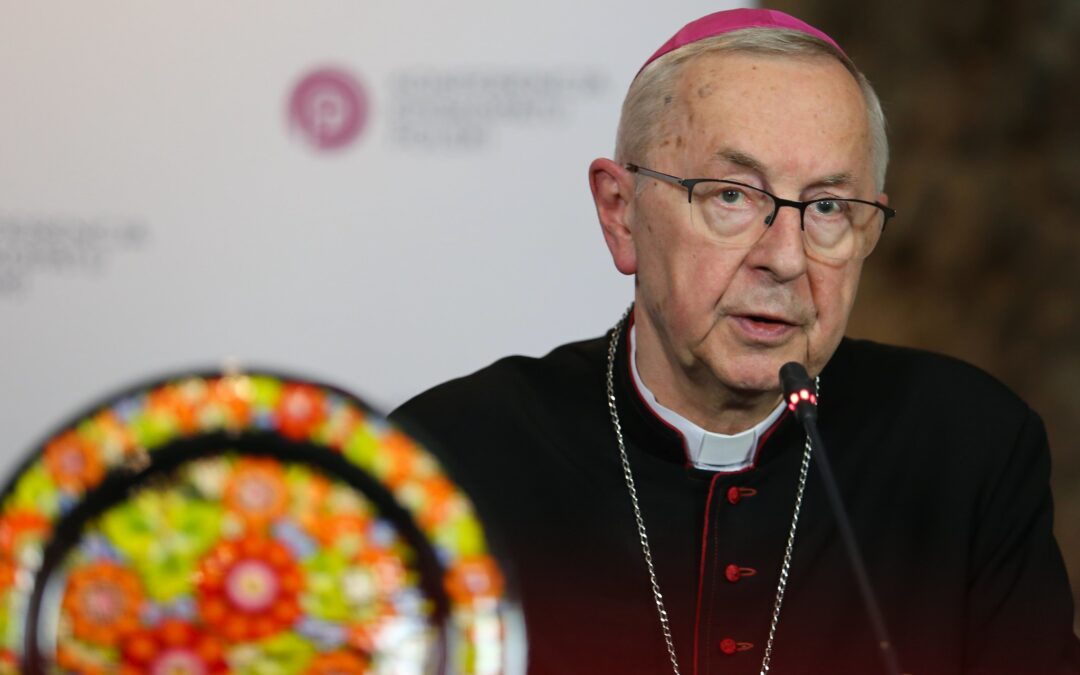Members of parliament who vote to allow abortion are “committing a grave sin and thus cannot receive holy communion”, the head of the Catholic church in Poland has warned.
His remarks come after all of Poland’s main opposition parties – most of whom have leaders who are practising Catholics – have expressed support for ending the current near-total ban on abortion, which is supported by the church.
Poland's near-total ban on abortion is opposed by most of the public, according to polls, and two opposition parties have called for a referendum to change the law
We look at whether and how such a referendum could be called, and what the outcome might be https://t.co/sQWJUAiOkn
— Notes from Poland 🇵🇱 (@notesfrompoland) April 3, 2023
“Human life is sacred and inviolable in every dimension and condition,” said Stanisław Gądecki, archbishop of Poznań and president of the Polish Episcopal Conference (KEP), the central organ of the Catholic church in Poland, at the annual March of Life and Family.
However, that “right to life is today most often threatened by financial interests”, warned Gądecki, quoted by Catholic news service Opoka.
“A law that violates a child’s natural right to life is unjust.” he continued. “Any MP who votes against life commits a grave sin and thus cannot receive holy communion.”
The head of Poland's Episcopate has criticised PiS for failing to fulfil its promise to protect life from the moment of conception.
PiS is likely to face renewed pressure in its second term to tighten the abortion law, already one of Europe's strictest https://t.co/FVl2oG4HA7
— Notes from Poland 🇵🇱 (@notesfrompoland) November 14, 2019
In 2020, Poland’s Constitutional Tribunal (TK) issued a ruling that tightened the country’s abortion law, which was already one of the strictest in Europe. It banned terminations justified by the diagnosis of severe birth defects in the foetus, which had previously accounted for 98% of legal abortions in Poland.
Now abortion is only permitted in two cases: when the pregnancy threatens the mother’s health or life, or when it results from a criminal act such as rape or incest.
The church strongly supported the tightening of the law, and was a target for the mass protests that broke out in the wake of the TK ruling. The ruling national-conservative Law and Justice (PiS) party, which has close ties to the church, also welcomed the ruling.
Those protesting against an anti-abortion ruling are seeking "to destroy Poland" and "end the history of the Polish nation", warns Jarosław Kaczyński.
He calls on supporters of his ruling PiS party to stand in defence of churches against the demonstrators https://t.co/KksHOREVpr
— Notes from Poland 🇵🇱 (@notesfrompoland) October 27, 2020
However, all opposition parties apart from the far-right Confederation (Konfederacja) have expressed opposition to the new near-total abortion ban.
Donald Tusk, leader of the centrist Civic Platform (PO), the largest opposition party, has called for the introduction of abortion on demand up to the 12th week of pregnancy. He has also required that all PO election candidates support that position.
Władysław Kosiniak-Kamysz and Szymon Hołownia, leaders of the centre-right Third Way (Trzecia Droga) coalition, have not gone so far but still favour a return to the abortion law from before the TK ruling. However, they want the issue to be decided by a national referendum.
Only those who support introducing abortion on demand can stand as election candidates for his party, says opposition leader @donaldtusk.
Decisions on terminating pregnancy up to the 12th week "will be solely up to the woman" under his party's rule https://t.co/W06cpzD3O4
— Notes from Poland 🇵🇱 (@notesfrompoland) September 1, 2022
Tusk, Kosiniak-Kamysz and Hołownia are all practising Catholics, as are many MPs from their parties. Hołownia began training to be a priest but eventually gave up that calling and entered journalism, before later becoming a politician.
In 2020, when Hołownia was standing as a candidate in presidential elections, a priest in Warsaw refused to allow him to receive communion, saying that his “conscience does not allow him to do so because of the views you are preaching”. The local diocese later apologised and reprimanded the priest.
Opinion polls also show that a large majority of Poles support liberalising the current abortion law, despite the fact that over 90% of the population are classified as Catholics, with 84% saying they are religious believers and 42% practising their faith at least once a week.
Support for allowing abortion up to the 12th week of pregnancy has risen to 70% in Poland, the highest level ever recorded by @Ipsos.
Various polling shows that support for access to abortion has increased since a near-total ban on abortion was introduced https://t.co/gzzxQjHQyr
— Notes from Poland 🇵🇱 (@notesfrompoland) November 16, 2022
During his recent remarks, Gądecki also reminded medical professionals that they are “obliged to show the highest respect for human life and its sacredness”.
“Killing can never be considered a curative action, even when the sole intention is to comply with the patient’s request,” he added. “It is rather a betrayal of the medical profession.”
The archbishop also declared that “respect for every human life requires recognition of the right to conscientious objection to abortion and euthanasia”.
The latter remarks refer to the so-called conscience clause, which allows doctors in Poland to refuse to provide a legal abortion if it conflicts with their religious beliefs. Last week, another opposition party, The Left (Lewica), proposed a law abolishing that clause.
The Left has proposed policies to improve women's safety, including abortion on demand, changing the legal definition of rape and paid menstrual leave.
It also wants to end the conscience clause that allows doctors to refuse abortions on religious grounds https://t.co/MzUGFnfHdl
— Notes from Poland 🇵🇱 (@notesfrompoland) June 16, 2023
Main image credit: EpiskopatNews/Flickr (under CC BY-NC-SA 2.0)

Daniel Tilles is editor-in-chief of Notes from Poland. He has written on Polish affairs for a wide range of publications, including Foreign Policy, POLITICO Europe, EUobserver and Dziennik Gazeta Prawna.




















